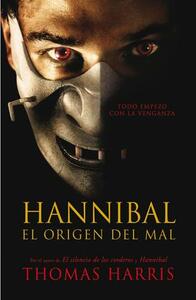Take a photo of a barcode or cover
Разликата между книжната и филмовата версия на образа на Ханибал Лектър е очевидна и доста голяма. Наистина, Антъни Хопкинс прави чудеса с ролята, но създава един Ханибал, който няма почти нищо общо с този в книгите. Може би този ужасяващ канибал и напрежението между него и инспекторката прави филмите успешни, но не такъв образ създава Томас Харис в книгите си.
Който ги е чел знае, че в тях много по-голямо внимание се обръща на произхода на Ханибал Лектър, на това защо и как той е станал това, което е. Освен това, голяма част от книгите са посветени на изкуството, пред което канибалът се прекланя, на изискания вкус и култура.
В четвъртата книга от поредицата най-после е подробно описано какво точно се случва по време на Втората световна война, което кара малкият Ханибал, от благородническия род Лектър, да изгуби всичко човешко в себе си още на осем години.
И точно в опитите да покаже защо и как Ханибал става канибал, Томас Харис пресолява манджата, включвайки военопрестъпници и нацисти, които са първите жертви на Ханибал, изкарвайки го едва ли не добър, а деянията му - оправдани. До сега в книгите, тайната съставка на хубавия роман винаги е била балансът между психопатичната жестокост и изкривения, но железен морал на Ханибал, между отхвърлянето на човещината и неистовия стремеж към красота. Тук този баланс се губи в полза на представянето на Лектър като едва ли не добродушен, романтично влюбен в настойницата си младеж.
Който ги е чел знае, че в тях много по-голямо внимание се обръща на произхода на Ханибал Лектър, на това защо и как той е станал това, което е. Освен това, голяма част от книгите са посветени на изкуството, пред което канибалът се прекланя, на изискания вкус и култура.
В четвъртата книга от поредицата най-после е подробно описано какво точно се случва по време на Втората световна война, което кара малкият Ханибал, от благородническия род Лектър, да изгуби всичко човешко в себе си още на осем години.
И точно в опитите да покаже защо и как Ханибал става канибал, Томас Харис пресолява манджата, включвайки военопрестъпници и нацисти, които са първите жертви на Ханибал, изкарвайки го едва ли не добър, а деянията му - оправдани. До сега в книгите, тайната съставка на хубавия роман винаги е била балансът между психопатичната жестокост и изкривения, но железен морал на Ханибал, между отхвърлянето на човещината и неистовия стремеж към красота. Тук този баланс се губи в полза на представянето на Лектър като едва ли не добродушен, романтично влюбен в настойницата си младеж.
I found this an incredibly fluid, fast read which provides a plausible backstory to Hannibal Lecter. Makes me want to reread the subsequent books.
I'm not normally a fan of war fiction, so was a little hesitant to go forward with this, but I loved the rest of this series and enjoyed the movie version, so felt it deserved a go. Judging from other reviewers, this seems to be one of those books you either love or hate. I had not invented my own history for Hannibal, so had nothing to compare it to. I also hold no doubts about the damaging powers of war and the strength of the desire for revenge. I applaud Harris for coming up with a backstory that explains all the facets of such a complicated character as Hannibal Lecter.
I'm not normally a fan of war fiction, so was a little hesitant to go forward with this, but I loved the rest of this series and enjoyed the movie version, so felt it deserved a go. Judging from other reviewers, this seems to be one of those books you either love or hate. I had not invented my own history for Hannibal, so had nothing to compare it to. I also hold no doubts about the damaging powers of war and the strength of the desire for revenge. I applaud Harris for coming up with a backstory that explains all the facets of such a complicated character as Hannibal Lecter.
Good story telling and attempt to humanize and give form to a great fictitious villain. I recommend it with some fava beans and a nice chianti.
challenging
dark
emotional
medium-paced
Plot or Character Driven:
A mix
Strong character development:
Yes
Loveable characters:
Complicated
Diverse cast of characters:
No
Flaws of characters a main focus:
Yes
I am reading these books in chronological order, and so starting at the beginning, with Hannibal's childhood during WWII is the place to start. This book is exquisitely written, and definitely makes you question what is truly evil, what is not. If you are like me and have watched all the movies and TV featuring Hannibal Lecter before reading the books, you will find the feel of the TV show is most similar to the feel of the book. It is evocative more than explicit. It is an easy read, but no less rewarding for it. I would recommend this to anyone!
This is Hannibal's backstory and the evolution of his sociopathy--and it's unexpectedly boring. What was functional when seen in enigmatic glimpses feels predictable when writ in full, making Hannibal too much like Harris's episodic serial killers: thoughtful but traditional in creation and, worse, never as interesting as Harris believes. Combined with the racism and fridging and off-color premise, it's a universal disappointment. This book isn't worth it, even and especially for fans. Hannibal is supposed to be different, more profound, but this book makes him into more of the same; skip it, and let him retain his mystery.
I thought this explanation of Hannibal’s life and how he came to be was satisfying enough. I wish there was even more context that relates to later in his life as well. And the writing was good, like always. I’m pleasantly surprised, as I wasn’t too hopeful after the last book!
What still bothers me is the police inspectors description of Hannibal as a monster. Does it make you a monster when you want to kill the people that ate his sister or for the way he behaves after seeing his family die and the people he cares about? Not that I think he's a good person either, but he doesn't enjoy torturing people or anything like that.
All in all my expectations for this book weren't especially high after having read the previous ones, but I still can't say that I enjoyed reading it. If it weren't for the fact that I wanted to read the complete quadrology I wouldn't have bothered myself with it.
All in all my expectations for this book weren't especially high after having read the previous ones, but I still can't say that I enjoyed reading it. If it weren't for the fact that I wanted to read the complete quadrology I wouldn't have bothered myself with it.
dark
emotional
sad
tense
medium-paced
Plot or Character Driven:
Plot
Strong character development:
Yes
Loveable characters:
Complicated
Diverse cast of characters:
Yes
Flaws of characters a main focus:
Yes
Graphic: Child abuse, Child death, Death, Gore, Torture, Violence, Cannibalism, Murder
Minor: War
Just like the movie, but in book form. As such, it was a great read. I wish I had Harris’ eye for detail.





